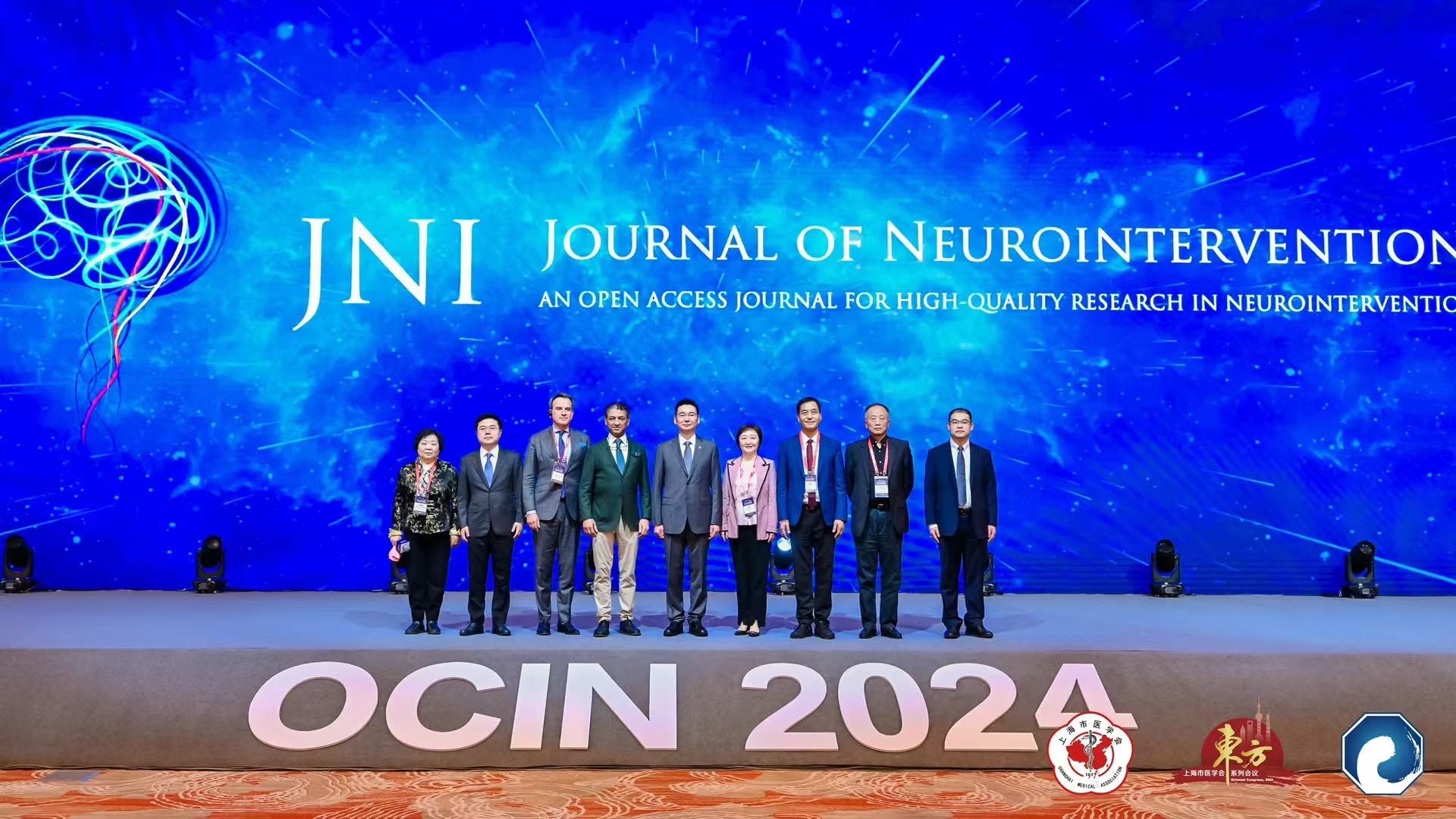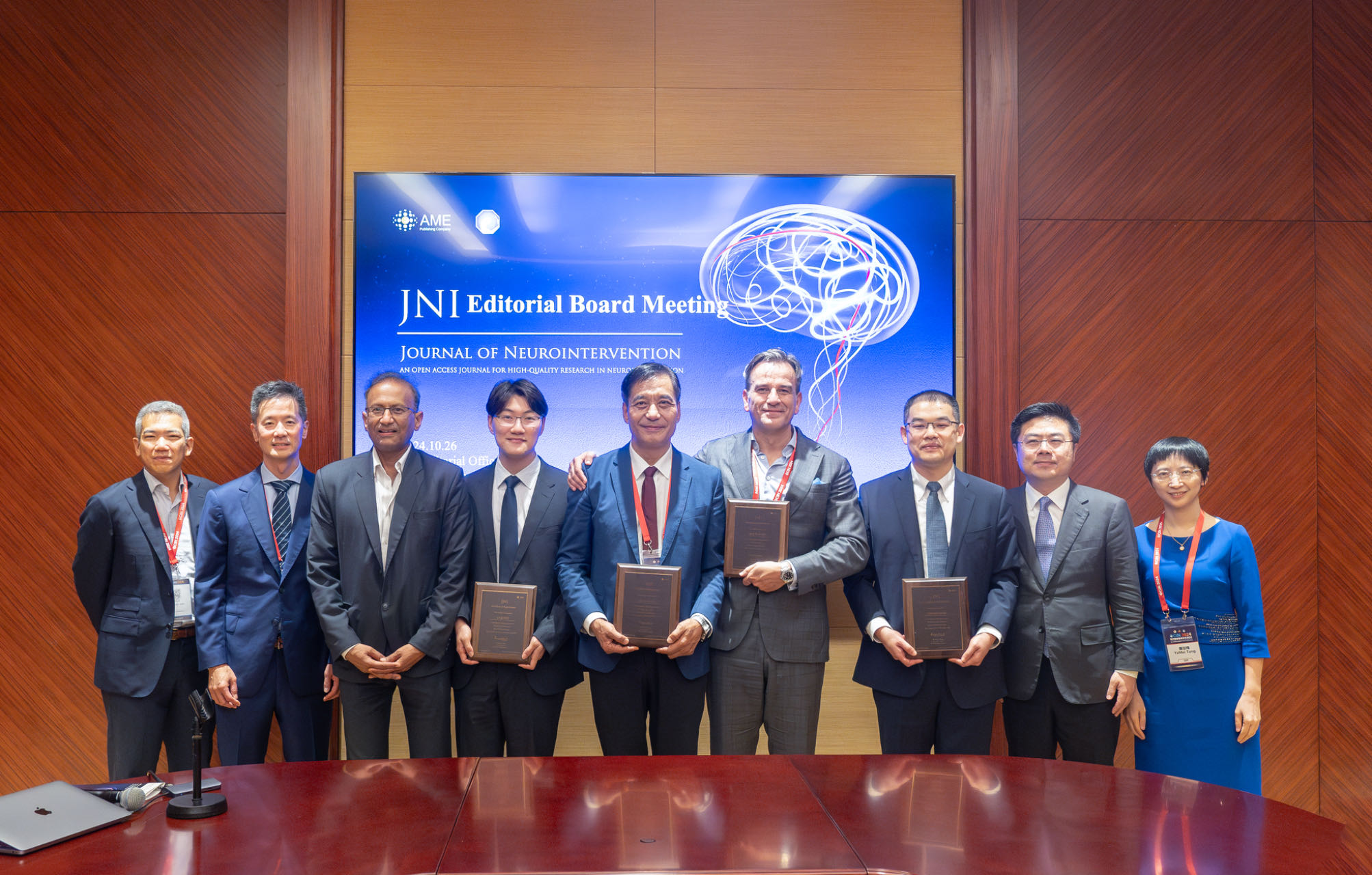Jens Fiehler1, Crystal M. Yan2
1Department of Diagnostic and Interventional Neuroradiology, University Medical Center Hamburg-Eppendorf, Hamburg, Germany; 2JNI Editorial Office, AME Publishing Company
Correspondence to: Crystal M. Yan. JNI Editorial Office, AME Publishing Company. Email: jni@amegroups.com
Editor’s note
From 24th to 27th, 2024, the 24th Oriental Conference of Interventional Neurovascology (OCIN 2024) was successfully held in Shanghai, China. This conference is designed for neurosurgeons, interventional neuroradiologists, neurologists, endovascular surgeons, residents, nurse practitioners, physician assistants and interventional technicians, and other health care professionals with a special interest in the field of management of neurovascular diseases and will be directly applicable to their daily practices.
As the official journal of OCIN, Journal of Neurointervention (JNI) held a launch ceremony(Figure 1) at the opening ceremony of the conference and held the first editorial board meeting(Figure 2) on the afternoon of the 26th.

Figure 1 The launch ceremony of Journal of Neurointervention

Figure 2 JNI’s editorial board meeting
Also, we were glad to have this chance to conduct an interview with Prof. Jens Fiehler, our Editor-in-Chief, the Director of the Department of Diagnostic and Interventional Neuroradiology in the University Medical Center Hamburg-Eppendorf in Germany.
Expert’s introduction
Professor Jens Fiehler is the Director of the Department of Diagnostic and Interventional Neuroradiology in the University Medical Center Hamburg-Eppendorf in Germany. He has published more than 700 peer-reviewed papers and he aims to support and foster high-quality research in Interventional Neuroradiology. His main research focus is imaging analysis and advanced study methodology in Interventional Neuroradiology. He is currently managing the imaging core lab of more than thirty studies. Jens Fiehler was a founding member of ESMINT and served in the Executive Committee, and its president. He is now a Board member and responsible for ESMINT’s “Stroke Outreach” program.
Interview (Video 1)
JNI: At this OCIN 2024, which topic are you most anticipating?
Prof. Fiehler: I'm very much interested in what's the hot topic in China at the moment. I see many cases and many great presentations and a lot of progress in the scientific arena, but also in the procedural techniques. So, a lot of things to see for me and to learn from my Chinese colleagues.
JNI: As we know, you are currently managing the imaging core lab of more than thirty studies. Can you discuss a recent breakthrough or significant finding from your studies that you believe will have a major impact?
Prof. Fiehler: We are part of many very interesting studies. I think the practically most important ones are probably the EMBOLISE study and the STEM study, both landmark studies in subdural hematoma treatment. Both studies are very positive, just like the MAGIC-MT study from China, and I think they will have the biggest impact. So, we analyzed all those images and we found big effects of embolization on the regression of subdural hematoma. An interesting analysis specifically of embolization is that the shape of the hematomas plays a role. So, the round ones that look like doughnuts are more susceptible to embolization than the flat ones that look more like pancakes. Such an analysis can be done by advanced analysis of images in our core lab and we are happy to be part of this.
JNI: What motivated you to pursue a career in Neuroradiology?
Prof. Fiehler: That's a very interesting question. It's very simple: it was a very fascinating idea for me to stick a catheter into one's groin and end up in the brain vessels and treat several conditions inside the skull. I thought this is absolutely fascinating to not to open the skull and to treat complex brain diseases. I was also always fascinated by brain imaging, to see how the brain looks and functions. And then, when the stroke studies became positive about 10 years ago with endovascular treatment, all of this came together. I was very lucky in the end that to have both interests merging into one. I feel very lucky, being part of this development.
JNI: What would be your suggestions for the young doctors who are pouring their lives into this filed?
Prof. Fiehler: It's a constantly changing field. My advice would be to find a good balance between listening to how things are done now, what can be taught and – on the other side - having your own ideas on how to move ahead. So, don't be too bold. Try to learn what has happened already because many things have been discovered before and don't need to be reinvented. But sometimes it's important to go to new avenues. And I think finding the right balance is very important. Asking yourself all the time “Am I right with this balance of old and new?”. I think that's my major advice.
JNI: As the Editor-in-Chief, what are your expectations for our new journal JNI?
Prof. Fiehler: I think it's a great idea to launch this journal because we have so much great neurointerventional studies ending up in journals with other focus of even remain unpublished and also to create a journal with strong roots in China where so much is going on. But JNI will still be reaching out to the global neurointerventional community, stay connected with all the latest developments, and welcoming submissions from all over the world. I think it's a great project and I feel honored to be a part of this.
